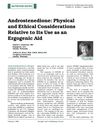
Hair loss causes emotional distress, leading to high spending on treatments, with Minoxidil and Propecia being common but having side effects.
 81 citations,
June 2014 in “American Journal of Men's Health”
81 citations,
June 2014 in “American Journal of Men's Health” Finasteride can cause lasting sexual, emotional, and cognitive issues, with varying severity.
 60 citations,
December 2015 in “Clinical and experimental dermatology”
60 citations,
December 2015 in “Clinical and experimental dermatology” Laser hair removal improves quality of life but emotional benefits decrease over time, suggesting more treatments are needed for lasting effects.
 2 citations,
March 2004 in “Reviews in Gynaecological Practice”
2 citations,
March 2004 in “Reviews in Gynaecological Practice” Hormonal changes and psychological issues can cause sexual dysfunction in postmenopausal women. Behavioral therapy is recommended first, with hormone replacement helping some symptoms but not libido. Testosterone can improve libido, but its effects on overall sexual function are unclear. Emotional and relationship issues should be addressed before using medication, and the benefits and risks of testosterone supplementation should be considered.
 21 citations,
November 2018 in “Journal of Psychosomatic Obstetrics & Gynecology”
21 citations,
November 2018 in “Journal of Psychosomatic Obstetrics & Gynecology” Women with PCOS have more emotional and body image issues than healthy women.
 14 citations,
January 2013 in “International Journal of Trichology”
14 citations,
January 2013 in “International Journal of Trichology” Treating hair loss requires a comprehensive approach that addresses both physical and emotional aspects, with a focus on diagnosis, patient education, and good communication.
 May 2017 in “Urology and andrology”
May 2017 in “Urology and andrology” Finasteride and dutasteride, used for prostate issues and hair loss, can cause side effects like sexual dysfunction and mental issues, which may continue even after stopping the medication, a condition called post-finasteride syndrome, for which there's currently no cure.
1 citations,
November 2021 in “Translational pediatrics” Glucocorticoids for progressive muscular dystrophy in children don't improve muscle strength or function but do increase certain side effects.
 3 citations,
March 2010 in “Acta Médica Portuguesa”
3 citations,
March 2010 in “Acta Médica Portuguesa” Polycystic ovary syndrome (PCOS) significantly impacts women's emotional well-being and social lives, requiring treatments that include psychological support.
 34 citations,
August 2005 in “Dermatologic Clinics”
34 citations,
August 2005 in “Dermatologic Clinics” Stress and emotional factors can worsen skin conditions by affecting the immune system.
March 2020 in “Annals of internal medicine” Monitor methotrexate side effects, research cannabis treatments, and use mycophenolate mofetil for lupus nephritis.
 December 2019 in “Buletin de psihiatrie integrativă”
December 2019 in “Buletin de psihiatrie integrativă” Skin treatments can improve both skin health and emotional well-being, but they require careful management of patient expectations and potential addiction risks.
 January 2010 in “Springer eBooks”
January 2010 in “Springer eBooks” Hirsutism can lower a woman's quality of life, causing emotional distress and affecting social and work opportunities.
 20 citations,
August 2018 in “Clinics in Dermatology”
20 citations,
August 2018 in “Clinics in Dermatology” The conclusion is that understanding and addressing the psychological effects of alopecia areata is important for effective treatment.

Propecia users with Androgenic Alopecia experienced a lower quality of life and more serious side effects compared to those using Minoxidil.

research Acne
231 citations,
April 2005 in “The New England Journal of Medicine” Acne affects most teenagers and can continue into adulthood, with various treatments available that show improvement but have concerns like antibiotic resistance and side effects.
 169 citations,
August 2004 in “Baillière's best practice & research. Clinical obstetrics & gynaecology/Baillière's best practice and research in clinical obstetrics and gynaecology”
169 citations,
August 2004 in “Baillière's best practice & research. Clinical obstetrics & gynaecology/Baillière's best practice and research in clinical obstetrics and gynaecology” Lower doses of treatments for hirsutism and acne in PCOS are effective and cause fewer side effects.
25 citations,
September 2014 in “Pharmacotherapy” Hormone therapy can improve mental health and quality of life for people with gender dysphoria, but long-term effects need more research.

The document concludes that hair loss in women is complex, often linked to aging, health conditions, and nutritional deficiencies, and emotional impacts should not be underestimated.
 October 2010 in “Journal of Men's Health”
October 2010 in “Journal of Men's Health” The conclusion is that doctors should be careful when prescribing 5α-reductase inhibitors due to possible serious side effects, and they should discuss these risks with patients.
 29 citations,
February 2017 in “International Journal of Women's Dermatology”
29 citations,
February 2017 in “International Journal of Women's Dermatology” Women with excessive male-pattern hair growth should get a full hormone check-up to find and treat any underlying issues, considering both medical and emotional aspects.
 17 citations,
November 2012 in “Maturitas”
17 citations,
November 2012 in “Maturitas” The conclusion is that proper evaluation and treatment of hair loss in midlife women is important, considering the emotional impact and potential for various treatments.
 6 citations,
October 1993 in “The journal of the Royal Society of Health”
6 citations,
October 1993 in “The journal of the Royal Society of Health” Children's hair loss has many causes and requires careful diagnosis and personalized treatment, including emotional support.
 1 citations,
November 2008 in “Gerontology”
1 citations,
November 2008 in “Gerontology” Older adults use lifestyle drugs to improve life quality and appearance, but caution is needed due to side effects and potential abuse.
 September 2021 in “Journal of skin and stem cell”
September 2021 in “Journal of skin and stem cell” Lactium, a milk protein, can help reduce symptoms of skin disorders linked to stress and anxiety without side effects.
 January 2012 in “Journal of the American Academy of Dermatology”
January 2012 in “Journal of the American Academy of Dermatology” 2011 dermatology discussions highlighted stem cell hair treatments, new lichen planopilaris therapies, skin side effects from cancer drugs, emerging allergens, and the link between food allergies and skin issues.
 January 2007 in “Elsevier eBooks”
January 2007 in “Elsevier eBooks” Alopecia areata is a reversible, autoimmune-related hair loss that can have significant emotional impact and uncertain treatment effectiveness.
 February 1999 in “Strength and Conditioning Journal”
February 1999 in “Strength and Conditioning Journal” Androstenedione, a hormone supplement, doesn't improve muscle or performance and can cause harmful side effects.
 31 citations,
November 2000 in “Clinical and Experimental Dermatology”
31 citations,
November 2000 in “Clinical and Experimental Dermatology” WAA-QOL measures impact of hair loss on women's well-being.
7 citations,
January 2010 in “Research journal of pharmaceutical, biological and chemical sciences” Herbal medicines can be effective alternatives for treating hair loss.


























